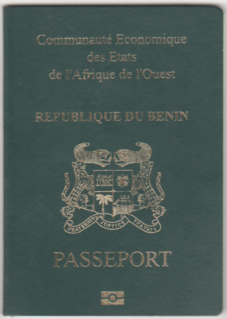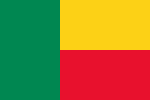
Paulin Hountondji is a Beninese philosopher, politician and academic. Since the 1970s he has taught at the Université Nationale du Bénin in Cotonou, where he is Professor of Philosophy. In the early 1990s he briefly served as Minister of Education and Minister for Culture and Communications in the Government of Benin.

The unicameral National Assembly is Benin's legislative body.

Lesbian, gay, bisexual, and transgender (LGBT) persons in Benin face legal issues not experienced by non-LGBT residents. Although same-sex sexual acts for both men and women are legal in Benin, homosexuals continue to face widespread persecution and are rarely open about their sexuality.

The Constitution of Benin was adopted by referendum 23 December 1956. The constitution is made up of a preamble, twelve titles, and 160 articles.

Benin–United States relations are the international relations between Benin and the United States. The two nations have had an excellent history of relations in the years since Benin embraced democracy. The U.S. Government continues to assist Benin with the improvement of living standards that are key to the ultimate success of Benin's experiment with democratic government and economic liberalization, and are consistent with U.S. values and national interest in reducing poverty and promoting growth. The bulk of the U.S. effort in support of consolidating democracy in Benin is focused on long-term human resource development through U.S. Agency for International Development (USAID) programs.

The following outline is provided as an overview of and topical guide to Benin:
Paulin Soumanou Vieyra was a Beninese/Senegalese film director and historian. As he lived in Senegal after the age of 10, he is more associated with that nation.

Benin is a diverse country linguistically. A total of 55 languages are spoken in Benin, with 50 being indigenous. Of those, French is the official language, and all the indigenous languages are considered national languages.

Wagasi is a type of Beninese cheese made from cow's milk. It is a speciality of northern Benin in Africa and is commonly made by the Fulani people. It is sold in abundance in Parakou, a city in central Benin.
Paulin is a French masculine given name and surname.
Benin, officially the Republic of Benin, is a country in Western Africa. It borders Togo to the west, Nigeria to the east and Burkina Faso and Niger to the north; its short coastline to the south leads to the Bight of Benin. Its size is just over 110000 km2 with a population of almost 8500000. Its capital is the Yoruba founded city of Porto Novo, but the seat of government is the Fon city of Cotonou. About half the population live below the international poverty line of US$1.25 per day.

Benin–Denmark relations refers to the current and historical relations between Benin and Denmark. Benin has an embassy in Copenhagen since 2005, and Denmark has an embassy in Cotonou. In 2007, the Danish development aid to Benin amounted 236 million DKK. Denmark is one of the largest aid donors to Benin and invested 60 million dollars in Benin in 2011.

Beninese cuisine is known in Africa for its exotic ingredients and flavorful dishes. Beninese cuisine involves lots of fresh meals served with a variety of sauces. Meat is usually quite expensive, and meals are generally light on meat and generous on vegetable fat.
Prostitution in Benin is legal but related activities such as brothel keeping and benefiting from the prostitution of others are illegal. UNAIDS estimates there to be about 15,000 prostitutes in the country. Most of these are migrants from neighbouring countries, mainly Nigeria, Togo and Ghana. Only 15% of the prostitutes are Beninese. Prostitution occurs on the streets, in bars, restaurants, hotels and brothels. With advent of the smartphone, many prostitutes use apps to make arrangements with clients.
Beninese American are Americans of Beninese descent. According to the census of 2000, in the United States there are only 605 Americans of Beninese origin. However, because in the first half of the eighteenth century many slaves were exported from Benin to the present United States, the number of African Americans with one or more Beninese ancestors could be much higher. The number of slaves from Bight of Benin exported to present United States exceeded 6,000 people, although this might consist not only in Benin, but also washes the shores of Ghana, Togo and Nigeria. It is also important to note that they were slaves from modern Benin, who planted voodoo in Louisiana. Currently, there are Beninese communities in cities such as Chicago or Washington D.C. and in other states as New York.

Visitors to Benin must obtain a visa from one of the Beninese diplomatic missions or apply for an E-visa,unless they come from one of the visa exempt countries.

The Beninese passport is issued to citizens of the Benin for international travel.

The Benin Air Force is the air force of Benin.














